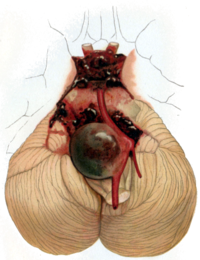
Photo from wikipedia
Cerebral bypass is often needed for complex aneurysms requiring vessel sacrifice, yet intraoperative predictors of ischemic risk in bypass-dependent territories are limited. Indocyanine Green (ICG)-based flow analyses (ICG-BFAs; Flow 800,… Click to show full abstract
Cerebral bypass is often needed for complex aneurysms requiring vessel sacrifice, yet intraoperative predictors of ischemic risk in bypass-dependent territories are limited. Indocyanine Green (ICG)-based flow analyses (ICG-BFAs; Flow 800, Carl Zeiss, Oberkochen, Germany) semi-quantitatively assess cortical perfusion, and in this work we determine the efficacy of ICG-BFA for assessing post-operative ischemic risk during cerebral bypass surgery for complex aneurysms. Retrospective clinical and pre/post-bypass intra-operative ICG-BFA data (delay and blood flow index [BFI]) on ten patients undergoing cerebral bypass for complex cerebral aneurysms requiring vessel sacrifice were collected from a single-institution prospective database and analyzed via non-parametric testing and logistic regression. Mean age was 55.9 ± 14.8 years. Pre/post-bypass delay (median 35.6 [5.1-51.3] vs. 26.0 [17.1-59.9]; p = 0.2) and BFI (median 56.1 [8.1-120.4] vs. 32.2 [3.0-147.4]; p = 0.2) did not significantly differ. Two patients (20%) developed post-operative ischemia in bypass dependent territories. Delay ratio did not differ between patients with and without post-operative ischemia (median 1.15 [0.67-1.64] vs. 0.83 [0.36-3.56]; p = 0.6), nor predict stroke risk (odds ratio = 1.1, p = 0.9). Conversely, BFI ratio was significantly lower for patients experiencing post-operative ischemia than those without ischemia (median 0.11 [0.06-0.17] vs. 0.99 [0.28-1.42]; p = 0.03). A BFI ratio <0.21 predicted the occurrence of post-operative ischemia (odds ratio = 0.02, p = 0.05). These data suggest that intraoperative ICG-BFA may help assess post-operative ischemic risk during cerebral bypass surgery for complex aneurysms requiring vessel sacrifice.
Journal Title: Journal of Clinical Neuroscience
Year Published: 2019
Link to full text (if available)
Share on Social Media: Sign Up to like & get
recommendations!